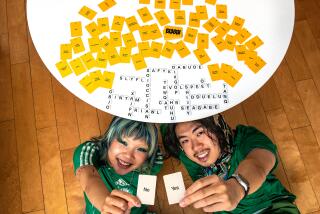New Board Game Used as Tool in Ministries : Communication: LifeStoriesâ focus on family lore improves relationships and is helpful as counseling tool.
MINNEAPOLIS â Move over, Monopoly. Pass, Parcheesi.
Here comes LifeStories.
Yes, LifeStories, a new board game developed by a trio including a pastor in the Evangelical Lutheran Church in America, the wife of a pastor and an architect.
LifeStories is a non-competitive game that is meant to provide an entertaining way of passing on family stories, legends and lore from one generation to the next.
And, while it is not a âreligiousâ game, LifeStories has won some rave reviews from church officials like the Rev. David Wilder, director of evangelism ministries for the Evangelical Lutheran Church in America, who says many congregations are finding it a useful tool in many of their ministries.
In particular, Wilder said, the game can be useful in ministries involving baby-boomers. As they age, the boomers are showing new interest in their family heritage and legacy, as well as the need to pass on that lore to their own children.
The game, already in its fourth printing, was created by the Rev. Wilfred Bockelman of Burnsville, Minn., Vivian Johnson of Shoreview, Minn., and architect Truman Howell of Golden Valley, Minn.
Bockelman said he learned the power of stories as a communications specialist in the former American Lutheran Church and has led workshops and developed presentations based on people telling their stories.
He cites the words of the late Alex Haley, author of âRoots,â as the inspiration for the game: âEvery time an older person dies, it is like a library burning down.â
LifeStories developed out of a trial-and-error process that began in 1988, when the trio formed a company aimed at videotaping oral histories of families through which grandparents or uncles and aunts could give tapes to their offspring.
When that venture didnât go very far, LifeStories was born.
The idea is simple. Players roll dice to determine their move and then advance their piece around the board. The square the marker lands on determines from which of four stacks of question cards the person is to draw. There are 240 questions.
The questions include âMemoriesâ (âWhat did you do on Saturday night as a teen-ager?â); âEtchingsâ (âHow was your family affected by the war?â); âValuablesâ (âIf you could give away a huge amount of money, who would you give it to and why?â); and âAlternativesâ (âAct like an animal and have the other players guess what it is.â).
Bockelman said he has been told that family relationships have been improved by playing the game, and some drug and alcohol treatment centers have reported the game is one of the best tools they have to get teen-age addicts to talk about their past experience.
Congregations are using Life-Stories in church membership classes, confirmation classes, premarital counseling and at retreats as a team-building tool.
Despite such uses, however, Bockelman and his colleagues at the soon-to-be-called Story Telling Co. are going for a mainstream market in those secular department and toy stores that stock such games as Mastermind, Racko and Tripoli.
In the works is FutureStories, a game that will focus on future hopes, dreams and aspirations and will emphasize environmental responsibilities.
More to Read
The biggest entertainment stories
Get our big stories about Hollywood, film, television, music, arts, culture and more right in your inbox as soon as they publish.
You may occasionally receive promotional content from the Los Angeles Times.










